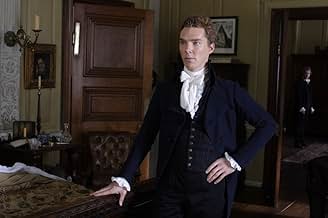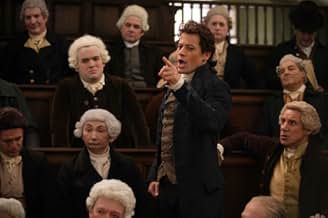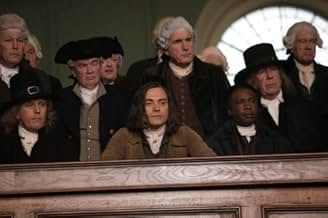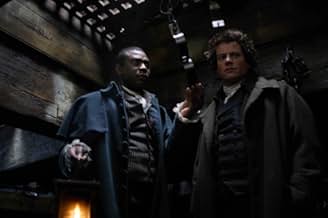IMDb-BEWERTUNG
7,4/10
26.249
IHRE BEWERTUNG
Füge eine Handlung in deiner Sprache hinzuThe idealist William Wilberforce maneuvers his way through Parliament, endeavoring to end the British transatlantic slave trade.The idealist William Wilberforce maneuvers his way through Parliament, endeavoring to end the British transatlantic slave trade.The idealist William Wilberforce maneuvers his way through Parliament, endeavoring to end the British transatlantic slave trade.
- Auszeichnungen
- 3 Gewinne & 6 Nominierungen insgesamt
Ciarán Hinds
- Lord Tarleton
- (as Ciaran Hinds)
Empfohlene Bewertungen
The idealist William Wilberforce (finely played by Ioan Grufudd) along with Rhomas Clarkson (Rufus Sewell) and a group of anti-slave trade maneuver his way through Parliament, endeavoring to end the British transatlantic trade that would lead to a great victory . Wilberforce helped by his lifelong friend and future P. M . William Pitt (Benedict Cumberbatch) will fight to get their purports for social justice . Wilberforce encounters the inspiration in newfound love interest (Romola Garai) to rejuvenate the battle with new ideas . After many attempts to bring legislation forward over twenty years, he is eventually gets a bill being passed through Parliament in 1807, in which abolishes the slavery the British empire forever.
This is a bicentennial tribute to William Wilberforce and his parliamentary bill abolishing the slave trade . Thought-provoking and moving film dealing with interesting issues , including fidelity to historical accuracy and detailed moral battles . Ioan Gruffudd is good as obstinate , romantic parliamentary member who battles relentlessly injustices ; he does a dignified portrayal about a great man . The prestigious cast shows their awareness of the contemporary impact about the brooding themes and are allowed to step out of period detail . Special mention to Benedict Cumberbatch as his lifelong friend Prime Minister William Pitt and N' Dour realizing an enjoyable portrait of an ex-slave . All of them are quietly upstaged by Albert Finney as a repent , remorse ex-slaver . The motion picture was marvelously directed by Michael Apted , he's director, producer of several successes such as ¨The word is not enough¨, ¨Gorillas in the mist¨ , ¨Class action¨, ¨Nell¨, ¨Enigma¨ , ¨Chronicles of Narnia II : The voyage of Dawn Treader¨ among others . Rating : Above average and worthwhile seeing , the whole family will enjoy this film .It's a very likable biography and enormously appealing for students and scholars . Overall this is a really nice movie . If you are familiar with the history then you will like this splendid film .
This is a biopic well based on historical events , adding more details over the largely described in the movie are the following : William Wilberforce (24 August 1759 – 29 July 1833) was a British politician, philanthropist, and a leader of the movement to abolish the slave trade. A native of Kingston upon Hull, Yorkshire, he began his political career in 1780, eventually becoming the independent Member of Parliament for Yorkshire (1784–1812). In 1785, he underwent a conversion experience and became an evangelical Christian, resulting in major changes to his lifestyle and a lifelong concern for reform. In 1787, he came into contact with Thomas Clarkson and a group of anti-slave-trade activists, including Granville Sharp, Hannah More and Charles Middleton. They persuaded Wilberforce to take on the cause of abolition, and he soon became one of the leading English abolitionists. He headed the parliamentary campaign against the British slave trade for twenty-six years until the passage of the Slave Trade Act of 1807. Wilberforce was convinced of the importance of religion, morality and education. He championed causes and campaigns such as the Society for Suppression of Vice, British missionary work in India, the creation of a free colony in Sierra Leone, the foundation of the Church Mission Society, and the Society for the Prevention of Cruelty to Animals. His underlying conservatism led him to support politically and socially repressive legislation, and resulted in criticism that he was ignoring injustices at home while campaigning for the enslaved abroad.In later years, Wilberforce supported the campaign for the complete abolition of slavery, and continued his involvement after 1826, when he resigned from Parliament because of his failing health. That campaign led to the Slavery Abolition Act 1833, which abolished slavery in most of the British Empire; Wilberforce died just three days after hearing that the passage of the Act through Parliament was assured. He was buried in Westminster Abbey, close to his friend William Pitt.
This is a bicentennial tribute to William Wilberforce and his parliamentary bill abolishing the slave trade . Thought-provoking and moving film dealing with interesting issues , including fidelity to historical accuracy and detailed moral battles . Ioan Gruffudd is good as obstinate , romantic parliamentary member who battles relentlessly injustices ; he does a dignified portrayal about a great man . The prestigious cast shows their awareness of the contemporary impact about the brooding themes and are allowed to step out of period detail . Special mention to Benedict Cumberbatch as his lifelong friend Prime Minister William Pitt and N' Dour realizing an enjoyable portrait of an ex-slave . All of them are quietly upstaged by Albert Finney as a repent , remorse ex-slaver . The motion picture was marvelously directed by Michael Apted , he's director, producer of several successes such as ¨The word is not enough¨, ¨Gorillas in the mist¨ , ¨Class action¨, ¨Nell¨, ¨Enigma¨ , ¨Chronicles of Narnia II : The voyage of Dawn Treader¨ among others . Rating : Above average and worthwhile seeing , the whole family will enjoy this film .It's a very likable biography and enormously appealing for students and scholars . Overall this is a really nice movie . If you are familiar with the history then you will like this splendid film .
This is a biopic well based on historical events , adding more details over the largely described in the movie are the following : William Wilberforce (24 August 1759 – 29 July 1833) was a British politician, philanthropist, and a leader of the movement to abolish the slave trade. A native of Kingston upon Hull, Yorkshire, he began his political career in 1780, eventually becoming the independent Member of Parliament for Yorkshire (1784–1812). In 1785, he underwent a conversion experience and became an evangelical Christian, resulting in major changes to his lifestyle and a lifelong concern for reform. In 1787, he came into contact with Thomas Clarkson and a group of anti-slave-trade activists, including Granville Sharp, Hannah More and Charles Middleton. They persuaded Wilberforce to take on the cause of abolition, and he soon became one of the leading English abolitionists. He headed the parliamentary campaign against the British slave trade for twenty-six years until the passage of the Slave Trade Act of 1807. Wilberforce was convinced of the importance of religion, morality and education. He championed causes and campaigns such as the Society for Suppression of Vice, British missionary work in India, the creation of a free colony in Sierra Leone, the foundation of the Church Mission Society, and the Society for the Prevention of Cruelty to Animals. His underlying conservatism led him to support politically and socially repressive legislation, and resulted in criticism that he was ignoring injustices at home while campaigning for the enslaved abroad.In later years, Wilberforce supported the campaign for the complete abolition of slavery, and continued his involvement after 1826, when he resigned from Parliament because of his failing health. That campaign led to the Slavery Abolition Act 1833, which abolished slavery in most of the British Empire; Wilberforce died just three days after hearing that the passage of the Act through Parliament was assured. He was buried in Westminster Abbey, close to his friend William Pitt.
This is a truly inspiring film that has much more than what appears on the surface. William Wilberforce was a man that understood persistance for change. He was a real World Changer that never knew the quit.
The film was beautifully done and the script was fantastic!! I love many of the phrase pulled from actual accounts of Wilberforce and Pitt's life.
Albert Finney does an amazing job as John Newton. He truly stole the show on this film.
Hollywood needs to pay attention and make more positive and moving films like this one!!!! Great Job.
The film was beautifully done and the script was fantastic!! I love many of the phrase pulled from actual accounts of Wilberforce and Pitt's life.
Albert Finney does an amazing job as John Newton. He truly stole the show on this film.
Hollywood needs to pay attention and make more positive and moving films like this one!!!! Great Job.
What follows is the text of a letter I composed for my parish bulletin (I am a priest and pastor of a University Parish in Tucson) after having seen Amazing Grace. I often recommend movies to my parishioners, but seldom write a full-fledged review. This weekend I made an exception for an exceptional movie.
Dear Friends,
It is a movie-lovers' favorite weekend: Oscar weekend. So I beg your indulgence as I offer not just a movie recommendation, but an actual review of the remarkable movie I saw on Friday. I had been hearing about it for several weeks and looking forward to its opening in Tucson. "Amazing Grace" tells the story of William Wilberforce, a young American Revolution era British Parliamentarian who waged a three-decade legislative battle to end Great Britain's involvement in the African slave trade (Slavery was outlawed in England six decades before our civil war.) Among those who had influenced this remarkable Englishman was John Newton, the slave ship captain turned evangelical preacher, who penned the lyrics of arguably the best known sacred song in the world, which also lends its title to the movie. Newton had known Wilberforce as a child and, in the film, serves as his conscience when the task is unclear or proves daunting..
This is no schmaltzy feel-good biopic. Everything about it is compelling. It is beautifully written and directed. The cinematography and film-editing are superb. The costume and sets are exquisite. And the acting is top-notch. Ioan Gruffudd, the young Welchman best known for his excellent portrayal of C.S. Forester's seafaring hero, Horatio Hornblower, in eight made-for-A&E movies (1998-2003), brings great depth and passion to his portrayal of this complex hero of social justice. Gruffudd's star is on the rise. Awardwinning actor, Albert Finney, graces this picture as an aged and eccentric Newton. The cast is rounded out by a gaggle of veteran British character actors who lend profundity to this compelling story. In addition to the cinematic elements that make this one of the few movies I have seen that I consider to be worth the $9 it costs to see a movie these days, it is first-rate storytelling! And Wilberforce is a hero whose story must be told. He grappled with one of my favorite issues: the place of faith in public life. As a young man, the rising political star began to rediscover an intense faith that had lain dormant for a time. His fire of conviction that something must be done about the slave trade was fueled by this reemerging faith. As he struggled with whether he should use his oratorical talents a politician or a preacher, he is convinced that he can use his popularity as an MP to do God's work by actively advocating for the voiceless slaves. The movie presents the story of a man who finds a perfect balance between his faith and his public lifeeach shaping the other in the face of a clear vocation. That his secular realm is that of politics and the time is one of great fear and institutionalized injustice gives this period movie much relevance in today's world. I hope every person of faith watches this movie. I especially think that it is pertinent for our student parishioners who may be struggling with the same issues as Wilburforce. (While I fear it would bore younger children, it would be good for older children and teens.) It opened on Friday at the El Con Cinema. I will be organizing a parish outing to see "Amazing Grace" in a couple of weeks. Whether you go then or another time, I recommend this movie as a great Lenten exercise. I loved it and consider it one of the most socially relevant films I've ever seen. "Amazing Grace" has long been one of my favorite sacred songs, but I will never hear it the same again.
Peace, Fr. Bart
Dear Friends,
It is a movie-lovers' favorite weekend: Oscar weekend. So I beg your indulgence as I offer not just a movie recommendation, but an actual review of the remarkable movie I saw on Friday. I had been hearing about it for several weeks and looking forward to its opening in Tucson. "Amazing Grace" tells the story of William Wilberforce, a young American Revolution era British Parliamentarian who waged a three-decade legislative battle to end Great Britain's involvement in the African slave trade (Slavery was outlawed in England six decades before our civil war.) Among those who had influenced this remarkable Englishman was John Newton, the slave ship captain turned evangelical preacher, who penned the lyrics of arguably the best known sacred song in the world, which also lends its title to the movie. Newton had known Wilberforce as a child and, in the film, serves as his conscience when the task is unclear or proves daunting..
This is no schmaltzy feel-good biopic. Everything about it is compelling. It is beautifully written and directed. The cinematography and film-editing are superb. The costume and sets are exquisite. And the acting is top-notch. Ioan Gruffudd, the young Welchman best known for his excellent portrayal of C.S. Forester's seafaring hero, Horatio Hornblower, in eight made-for-A&E movies (1998-2003), brings great depth and passion to his portrayal of this complex hero of social justice. Gruffudd's star is on the rise. Awardwinning actor, Albert Finney, graces this picture as an aged and eccentric Newton. The cast is rounded out by a gaggle of veteran British character actors who lend profundity to this compelling story. In addition to the cinematic elements that make this one of the few movies I have seen that I consider to be worth the $9 it costs to see a movie these days, it is first-rate storytelling! And Wilberforce is a hero whose story must be told. He grappled with one of my favorite issues: the place of faith in public life. As a young man, the rising political star began to rediscover an intense faith that had lain dormant for a time. His fire of conviction that something must be done about the slave trade was fueled by this reemerging faith. As he struggled with whether he should use his oratorical talents a politician or a preacher, he is convinced that he can use his popularity as an MP to do God's work by actively advocating for the voiceless slaves. The movie presents the story of a man who finds a perfect balance between his faith and his public lifeeach shaping the other in the face of a clear vocation. That his secular realm is that of politics and the time is one of great fear and institutionalized injustice gives this period movie much relevance in today's world. I hope every person of faith watches this movie. I especially think that it is pertinent for our student parishioners who may be struggling with the same issues as Wilburforce. (While I fear it would bore younger children, it would be good for older children and teens.) It opened on Friday at the El Con Cinema. I will be organizing a parish outing to see "Amazing Grace" in a couple of weeks. Whether you go then or another time, I recommend this movie as a great Lenten exercise. I loved it and consider it one of the most socially relevant films I've ever seen. "Amazing Grace" has long been one of my favorite sacred songs, but I will never hear it the same again.
Peace, Fr. Bart
10tollini
I saw this film on October 10th, 2006 in Indianapolis. I am one of the judges for the Heartland Film Festival's Truly Moving Picture Award. A Truly Moving Picture "
explores the human journey by artistically expressing hope and respect for the positive values of life." Heartland gave that award to this film.
This is an inspiring story based on a legendary historical British Member of Parliament, William Wilberforce. During the late 18th century and early 19th century, a very young Wilberforce is elected to Parliament and over the course of several decades leads the fight to ban slavery.
Today this seems like an easy, obvious and intuitive decision. But this was not so 200 years ago. The film clearly explains the entrenched economic motives and the political motives for slavery. Wilberforce starts out as almost a force of one and slowly builds abolitionist momentum by brilliant oratory, political maneuvers, and appealing to his fellow man's better nature.
Ioan Gruffudd is totally believable in explaining to the audience the complexity and heroism of Wilberforce. Wilberforce over the course of his life is sickly and strong, religious and worldly, naive and romantic, and idealistic and practical.
During the course of this mostly political story, we get to see the immense cruelty shown to the captured Africans turned into slaves. We are shown the slave sailing ships where the captured are treated inhumanely and die of starvation, neglect, disease, and filth. Man's inhumanity to man was never worse.
Wilberforce is a great man of history even though mostly forgotten today. He respected his fellow man regardless of their station in life. He was always willing to sacrifice his life and health to help others. And his compassion and spirit was always masked by his humility. He is a hero for all ages.
This is a period piece and you are lost in it because of the attention to detail. The sets, art direction, and costumes allow you to totally suspend disbelief and be moved by the story.
FYI There is a Truly Moving Pictures web site where there is a listing of past Truly Moving Picture Award winners that are now either at the theater or available on video.
This is an inspiring story based on a legendary historical British Member of Parliament, William Wilberforce. During the late 18th century and early 19th century, a very young Wilberforce is elected to Parliament and over the course of several decades leads the fight to ban slavery.
Today this seems like an easy, obvious and intuitive decision. But this was not so 200 years ago. The film clearly explains the entrenched economic motives and the political motives for slavery. Wilberforce starts out as almost a force of one and slowly builds abolitionist momentum by brilliant oratory, political maneuvers, and appealing to his fellow man's better nature.
Ioan Gruffudd is totally believable in explaining to the audience the complexity and heroism of Wilberforce. Wilberforce over the course of his life is sickly and strong, religious and worldly, naive and romantic, and idealistic and practical.
During the course of this mostly political story, we get to see the immense cruelty shown to the captured Africans turned into slaves. We are shown the slave sailing ships where the captured are treated inhumanely and die of starvation, neglect, disease, and filth. Man's inhumanity to man was never worse.
Wilberforce is a great man of history even though mostly forgotten today. He respected his fellow man regardless of their station in life. He was always willing to sacrifice his life and health to help others. And his compassion and spirit was always masked by his humility. He is a hero for all ages.
This is a period piece and you are lost in it because of the attention to detail. The sets, art direction, and costumes allow you to totally suspend disbelief and be moved by the story.
FYI There is a Truly Moving Pictures web site where there is a listing of past Truly Moving Picture Award winners that are now either at the theater or available on video.
Most people probably have vaguely heard of William Wilberforce without knowing too much about his life. The power of his story, and the power of the central issue (the abolition of slavery), carries this movie that veers from artful to clumsy.
The movie can be confusing, as it moves back and forth between phases of Wilberforce's life. Often I found myself wondering for a few moments, "When is this?" Also, much of the political intrigue has to be inferred, since the backgrounds of the various players - particularly Wilberforce's adversaries - are not adequately explained.
However, the performances are quite good, some bordering on excellence. Some might argue that the villains are too simplistically presented, but on an issue like slavery, it is expected that the opposition would be completely unsympathetic (just as Nazis are rarely presented with any hint of sympathy).
I am sure the writers took some liberties with history. By the way, the tune we now associate with the hymn "Amazing Grace" did not become the melody for John Newton's famous lyrics until after Wilberforce's death.
I just watched this movie at a private screening for attendees of the National Prayer Breakfast in Washington, DC (clergy are a natural audience for this movie). The reception was favorable, but this was an audience for which the moralizing of the story would naturally resonate. I'm not sure it will attract a very broad audience - this is a movie that may well find its niche on DVD being shown in high school history classes and at church gatherings.
It is a nice, historical, period piece. It is (largely due to subject matter) reminiscent of "Amistad", with similar pacing.
Should you see it? It depends on whether you like this TYPE of movie. If this genre (historical drama) interests you, this is quite well-done. It might even inspire you to read more about Wilberforce. Go see it. If you are in search of movies that teach lessons about good values and perseverance in fighting for what's right, go see it.
But if you have no idea when the French Revolution occurred relative to our War of Independence, and if it doesn't come naturally to you to remember that the newborn U.S. was allied with France against Britain during that period - and if you don't care - this movie might not be your idea of a fun time.
If I were the producers, I would add one of those "scrolling text" historical introductions to the film before final release, though it is probably too late.
The movie can be confusing, as it moves back and forth between phases of Wilberforce's life. Often I found myself wondering for a few moments, "When is this?" Also, much of the political intrigue has to be inferred, since the backgrounds of the various players - particularly Wilberforce's adversaries - are not adequately explained.
However, the performances are quite good, some bordering on excellence. Some might argue that the villains are too simplistically presented, but on an issue like slavery, it is expected that the opposition would be completely unsympathetic (just as Nazis are rarely presented with any hint of sympathy).
I am sure the writers took some liberties with history. By the way, the tune we now associate with the hymn "Amazing Grace" did not become the melody for John Newton's famous lyrics until after Wilberforce's death.
I just watched this movie at a private screening for attendees of the National Prayer Breakfast in Washington, DC (clergy are a natural audience for this movie). The reception was favorable, but this was an audience for which the moralizing of the story would naturally resonate. I'm not sure it will attract a very broad audience - this is a movie that may well find its niche on DVD being shown in high school history classes and at church gatherings.
It is a nice, historical, period piece. It is (largely due to subject matter) reminiscent of "Amistad", with similar pacing.
Should you see it? It depends on whether you like this TYPE of movie. If this genre (historical drama) interests you, this is quite well-done. It might even inspire you to read more about Wilberforce. Go see it. If you are in search of movies that teach lessons about good values and perseverance in fighting for what's right, go see it.
But if you have no idea when the French Revolution occurred relative to our War of Independence, and if it doesn't come naturally to you to remember that the newborn U.S. was allied with France against Britain during that period - and if you don't care - this movie might not be your idea of a fun time.
If I were the producers, I would add one of those "scrolling text" historical introductions to the film before final release, though it is probably too late.
Wusstest du schon
- WissenswertesDuring the scene in which William Wilberforce (Ioan Gruffudd) sings "Amazing Grace" at the card house, the singing was performed live by Gruffudd. In the previous several takes, a playback had been used, but it is Gruffudd singing in the final film. Director Michael Apted had no idea whether or not Gruffudd could actually sing. Little did he know, Gruffudd is an accomplished soloist and choir singer. With a little practice, Gruffudd performed for the first time on-set while the cameras were rolling, all much to the surprise of the cast, crew, and director.
- PatzerThere were at least 3 grammar mistakes: several uses of "I" when "me" should have been used. Wilburforce also says "By who?" As a graduate of Cambridge, he would have said, "By whom?"
- Zitate
John Newton: Although my memory's fading, I remember two things very clearly. I'm a great sinner and Christ is a great Savior.
- VerbindungenFeatured in Tavis Smiley: Folge vom 23. Januar 2007 (2007)
Top-Auswahl
Melde dich zum Bewerten an und greife auf die Watchlist für personalisierte Empfehlungen zu.
Details
- Erscheinungsdatum
- Herkunftsländer
- Offizieller Standort
- Sprache
- Auch bekannt als
- Amazing Grace
- Drehorte
- Produktionsfirmen
- Weitere beteiligte Unternehmen bei IMDbPro anzeigen
Box Office
- Bruttoertrag in den USA und Kanada
- 21.250.683 $
- Eröffnungswochenende in den USA und in Kanada
- 4.305.000 $
- 25. Feb. 2007
- Weltweiter Bruttoertrag
- 32.120.360 $
- Laufzeit
- 1 Std. 58 Min.(118 min)
- Farbe
- Sound-Mix
- Seitenverhältnis
- 1.85 : 1
Zu dieser Seite beitragen
Bearbeitung vorschlagen oder fehlenden Inhalt hinzufügen











































